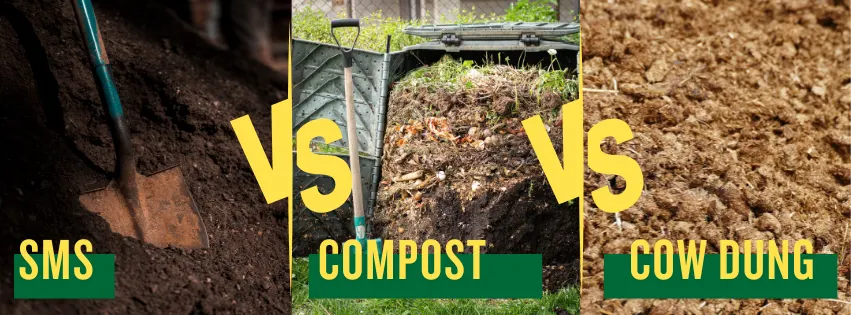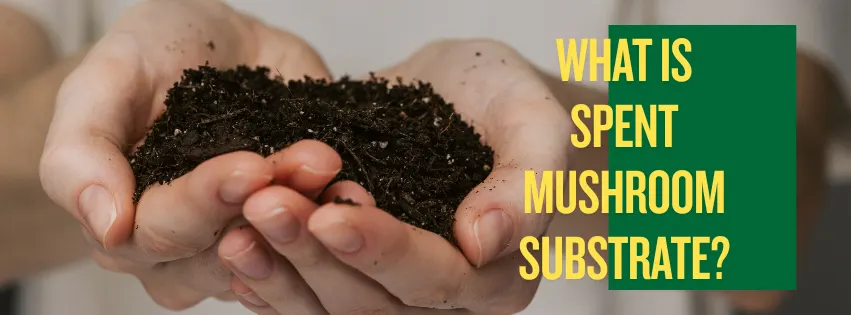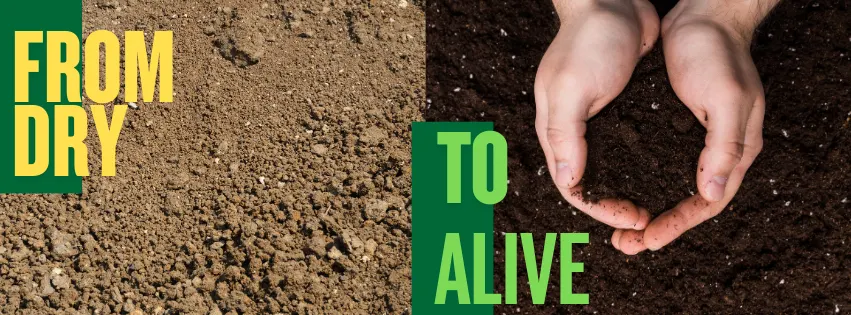
SMS vs Compost vs Cow Manure: Which Fertilizer is Best?
Soil’s Eternal Question
Every farmer asks the same timeless question: “What should I feed my soil?” For centuries, cow dung manure and traditional compost have been the backbone of organic farming. In recent years, however, Spent Mushroom Substrate (SMS) — also called mushroom compost or mushroom soil — has emerged as a strong alternative.
So, when it comes to SMS vs compost vs cow manure, which truly makes your soil happiest?
The Three Natural Fertilizers Explained
1. What is SMS (Mushroom Compost)?
SMS is the leftover growing medium from mushroom farms. It contains straw, poultry manure, gypsum, and organic matter enriched during mushroom cultivation. Once mushrooms are harvested, the substrate is not waste — it becomes a nutrient-rich organic soil conditioner.
Key traits of SMS:
Rich in organic matter & calcium.
Improves soil aeration & moisture retention.
Releases nutrients slowly, reducing leaching.
Balances acidic soils (common in Himalayan regions like Uttarakhand).
2. What is Traditional Compost?
Compost is created by decomposing crop residues, kitchen waste, and green materials. It is:
Rich in humus and microbial life.
A general-purpose soil builder.
Time-tested and widely used in both farming and gardening.
3. What is Cow Dung Manure?
Cow manure is one of the oldest organic fertilizers. Traditionally used across India, it provides:
Moderate nutrients (especially nitrogen).
Improvement in soil texture and water retention.
A renewable, farm-based fertiliser source.
However, it requires proper composting to reduce pathogens and odors before field application.
SMS vs Compost vs Cow Manure: A Practical Comparison
| Feature | SMS (Mushroom Soil / Used Mushroom Compost) | Traditional Compost | Cow Dung Manure |
|---|---|---|---|
| Nutrient release | Slow & steady → long-lasting effect | Moderate → balanced nutrition | Quick nitrogen but less balanced |
| Soil benefits | Improves structure, aeration, water retention | Builds humus & microbial diversity | Enhances moisture & texture |
| pH impact | Slightly alkaline → corrects acidic soils | Neutral to slightly acidic | Slightly alkaline |
| Eco-benefit | Recycles mushroom waste → circular farming | Recycles kitchen & farm waste | Traditional recycling of livestock waste |
| Best suited for | Large farms, vegetable fields, acidic soils | Gardens, nurseries, all-purpose | Cereal crops, mixed farming systems |
| Cost & availability | Low-cost near mushroom hubs | Variable, requires time & labor | Abundant in rural areas |
| Handling & odor | Low odor when aged properly | Mild earthy smell, easy to handle | Strong odor unless composted |
| Microbial activity | Good microbial base from mushroom cultivation | Very diverse, boosts soil microbiome | Moderate, improves with composting |
| Preparation time | Ready after 6–8 months of aging | 3–6 months of composting | 6+ months for safe use |
Organic Fertilizer Comparison: Which Works Best?
Cow Dung Manure:
Cow manure is traditional, abundant, and trusted in Indian farming.
Its nutrient content depends heavily on the animal’s diet and how well the manure is composted. Fresh cow dung contains high ammonia and pathogens, so it must be well-rotted for 6–8 months before safe use.
It provides quick nitrogen, but often lacks balanced phosphorus and potassium.
Works best when farmers keep livestock and can recycle manure daily.
Mushroom Compost (SMS):
SMS is a by-product of mushroom cultivation and contains a mix of straw, gypsum, poultry manure, and organic matter partially broken down by mushrooms.
Nutrient content is more consistent, making it reliable for planned applications.
Rich in calcium, it corrects soil acidity — a big advantage in hilly regions like Uttarakhand.
Available in bulk at low cost near mushroom farms, making it scalable for large fields.
Provides slow and steady nutrient release, reducing leaching losses common with cow dung.

Compost vs Mushroom Compost (SMS)
Traditional Compost:
Produced from kitchen waste, crop residues, and farmyard manure.
Builds rich humus and supports a diverse soil microbiome, improving soil regeneration.
Excellent for gardens, nurseries, and small vegetable patches, where high microbial activity boosts plant health.
Preparation takes 3–6 months, and quality varies based on the materials used.
Mushroom Compost (SMS):
Already partially composted during mushroom cultivation, then aged 6–8 months for safe use.
Acts as a soil conditioner in bulk farming, improving aeration, structure, and water retention.
Because of its slow-release nature, SMS is less likely to burn crops, even when used generously.
Cost-effective near mushroom hubs — farmers can access truckloads at prices lower than preparing large amounts of compost themselves.

Compost vs Cow Dung Manure
Compost:
Balanced in nutrients, with strong microbial life.
Improves soil’s water-holding capacity and reduces dependence on chemicals.
Suitable for almost all crops and soils, making it highly versatile.
Cow Dung Manure:
Provides a quick boost of nitrogen, which is beneficial for cereal crops such as wheat and maize.
Must be aged properly to avoid burning plants and spreading diseases.
In villages, cow dung is also used as fuel, flooring material, and bio-gas feedstock, reducing its availability solely for soil.

Why SMS is Emerging as the Smarter Choice
While compost and cow dung remain essential, SMS is gaining recognition because it:
Supports sustainable farming by recycling mushroom industry waste.
Provides long-term soil fertility with less frequent applications.
Helps balance acidic soils (ideal for farmers in hilly states like Uttarakhand).
Reduces reliance on chemical fertilizers, making farming more eco-friendly.
Is available in bulk at low cost, making it practical for large farms.
As Sadhguru reminds us: “If we do not take care of our soil, we will leave behind a planet that is no longer green but brown.” SMS is a step toward caring for that soil.
When to Use Each Fertilizer
Use SMS (Mushroom Compost):
For vegetables like tomatoes, potatoes, cabbage, beans, and leafy greens.
When farming in acidic soils.
For bulk field application at low cost.
Use Traditional Compost:
For home gardens, nurseries, and mixed cropping systems.
When soil needs a microbial boost.
Use Cow Dung Manure:
For cereal crops and traditional farms with livestock.
When farmers have easy access to cow dung as part of daily routines.
Dosage & Application Tips
SMS (Mushroom Compost):
Mix at 25–30% with soil for vegetables.
Apply 2–3 inches per season in open fields.
Always use aged SMS (6–8 months old) to avoid salt damage.
Compost:
Apply 1–2 inches per crop cycle.
Safe for direct garden use.
Cow Dung Manure:
Must be well-rotted (6+ months) before use.
Apply 5–10 tons per acre depending on crop.
Global & Indian Context
In the US and Europe, mushroom compost is a standard soil amendment for vegetable farming.
In India, cow dung manure has cultural importance, but modern farmers are exploring SMS for large-scale soil regeneration.
States like Punjab, Haryana, and Uttarakhand generate massive SMS supplies that could transform soil fertility if adopted widely.
As Albert Howard, pioneer of organic farming, once said: “The health of soil, plant, animal and man is one and indivisible.” SMS aligns with this holistic view.
The Best Natural Fertilizer for Modern Farming
When comparing SMS vs compost vs cow manure, the choice depends on your farming goals:
Compost is the universal soil builder.
Cow dung is the traditional ally for mixed farms.
SMS (Mushroom Compost) is the modern, scalable, eco-friendly solution for today’s agriculture.
👉 If you are a farmer near a mushroom hub, don’t let this treasure go to waste. Choose SMS for your fields — a step towards soil regeneration, higher yields, and sustainable farming.


